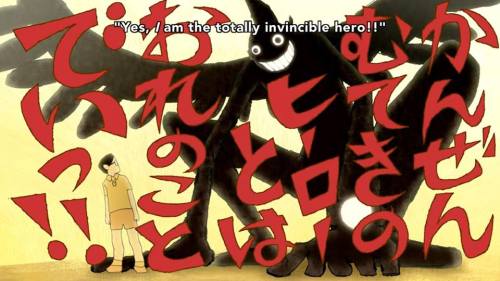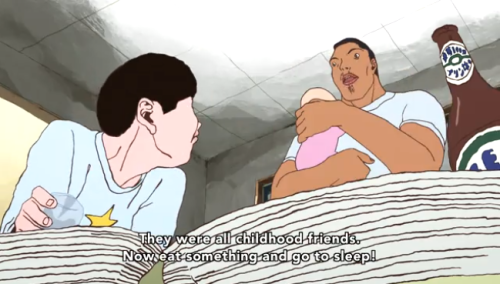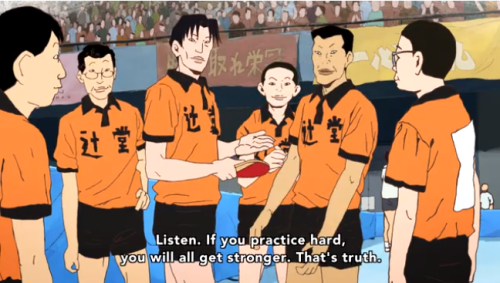I know, I don’t have time for this: Ping Pong The Animation finished airing last season, and I need to start reviewing on animes that are about to air this week. But my fellow bloggers, who believe that Ping Pong The Animation is the best anime and claimed to be enlightened, insisted me and others to watch the show to become enlightened as well. (You can check their blogs by clicking the links at the right column of this blog homepage). We have had good amount of discussions, but I still do not think they are as enlightened as they claim. I do agree Ping Pong is a really good anime that you should all watch at least once in your lifetime, and probably the best anime in the recent years, but I feel that Ping Pong gives a false sense of enlightenment to the most people. (The following review will be full of spoilers, so please go buy BD or stream before you read this. If you do not care about spoilers, whatever, I warned you.)
Ping Pong makes it clear who the hero of this show is. It is no one other than Peco, a social, cheerful guy who truly loves the game of Ping Pong. He helps Dragon to play the game for himself and to fly like his father had always dreamed. Peco rescues Smile from his never-ending apathy and allows him to finally smile again through ping pong. Peco is imbued with the spirit of ping pong, and he shares this joy with others who fail to recognize it.
But is the reality really that convenient? Why couldn’t Dragon and Smile find a way to enjoy the game on their own? Why are they dependent on Peco? Why couldn’t they save themselves and become heroes of their own?
Before I go over those answers, I would first like to explain the definition of enlightenment. Enlightenment essentially means “awakening,” and Wikipedia defines it as the “full comprehension of a situation.” It is “attained when all limitations have been removed from the mind and one’s positive potential has been completely and perfectly realized. It is a state characterized by infinite compassion, wisdom and skill.”
Ok, now let’s go back to our questions. I am sure you all have many various answers, but I believe Dragon and Smile ended up depending on Peco not because they did not know the answers to their problems. Peco knew his skills were becoming deteriorated, but he ignored this and pretended he did not know until China (Kong) gave him a “spark” of realization. Just like Peco needed someone else to gain this “spark” to grasp his situation, Dragon and Smile needed someone else to realize what they already knew. They have finally become awakened, and gained comprehension of their situation.
But is this enlightenment? Well, kind of. Enlightenment does not necessarily mean learning new things. Enlightenment could mean realizing what we have always known but chose not to accept. In this sense, Peco, Dragon, and Smile were enlightened through this Championship tournament.
However, this is not the full enlightenment, the entire truth. The true enlightenment is when you realize nothing really matters in this world because everything is essentially delusional. Winning the championship? Becoming Olympic gold medalist? These are all pointless in the end. Peco’s sensei used to be a cute Ping Pong girl, and Butterfly Jo used to be famous and successful ping pong player. But ages caught up with them, and they became old. Some will remember them in the future, but their glories will be lost in memories forever. Their achievements and ping pong career are meaningless after death.
This is why I said that Ping Pong gives a false sense of enlightenment to the most people. Peco “saved” Dragon and Smile as a hero, but by doing so he lost himself. He thought by sacrificing himself he could save these two, but he began to grow full of himself in this heroism. If he really wanted to enlighten Dragon and Smile, Peco should have told them to become their own heroes and save themselves.
If you still do not agree with me or do not understand the problem I am talking about, imagine this: Two men are waiting for a train that almost never arrives when they could have easily walked to their destination. Who is the real hero: the train conductor who finally arrives to pick them up, or a guy who tells them that there are other methods to go to their destination, such as walking? Both train and walking will end up in the same place, but the result of this choice is different. If these two men chose to wait for the train, the train conductor considers himself as special person, and these men will never know how to walk to their destination. On the other hand, if these two men chose to listen to the guy and chose to walk, they will now know they can accomplish on their own. In my opinion, this guy who told them there are other ways and gave them a spark of epiphany is the truer hero than the train conductor, who gave the others confidence that they can depend on him.
This is why Peco, Dragon, and Smile are not fully enlightened. They know their problems, they know the answers to their problems, but they do not know how to fill in the blanks on their own. The only guy who is fully, truly enlightened is China. China himself becomes enlightened in the end by realizing that he does not need to go back to his native country – he becomes happy in his new home, helping others to be better in ping pong and enjoy playing it. He is no longer driven by stress, and he no longer considers others “inferiors.” Instead, China is driven by brotherly compassion and tries to rescue these “inferiors” by trying to help them to learn the game of ping pong themselves. He does not tell them to buy better equipment or switch positions because he knows those do not matter in the end. Smile pretends that nothing matters, but he secretly yearns for somebody to help him; in contrast, China saves himself from his misery and is the only one who becomes truly enlightened in this show.
Enlightenment does not come from reading books or learning from wise monks. It comes from experiences, and one can become enlightened even from his, her, or zis daily lives. If people wish to become enlightened, they must first be able to learn how to transcend realities – anywhere, anytime on their own. Those who claim that they have become enlightened through watching Ping Pong are false. They are not truly enlightened because Ping Pong The Animation has become their hero. If they wish to be truly enlightened, they need to become their own heroes and must learn how to live their lives without needing the help of others, including animations. You are the only ones who have ever lived your lives, and if you cannot save yourselves, nobody can. Once you attain this enlightenment, you will soon realize that nothing really matters in the end, and every anime and anime blog will start to seem pointless – since everything in life is essentially just a delusion. So why live?




It’s true that Dragon and Smile never realized their enlightenment completely by themselves, but a large part of the anime is meant to illustrate that complete isolation and self-denial is foolish. Buddhism is famous for the idea of the Middle Way, something balanced between the extremes of pure materialism and pure asceticism. Gautama Buddha himself famously advocated against the self-starving, hermetic asceticism that characterized some South Asian philosophies.
Smile and Dragon both locked themselves up into tight corners. They did not go on a journey to the mountaintops to understand the universe. They instead chose to stay by themselves and never improve. It was not that case that Peco was “forcing” them to become enlightened; all Peco did was create the circumstances and environmental factors that would allow Smile and Dragon to become enlightened on their own.
For example, Dragon becomes enlightened when the Hero of Ping Pong shines a bright light into the dark bathroom stall. In this scene, the hero extends his arm but quickly pulls it back, forcing Dragon to grow wings on his own, NOT by holding the Hero’s hand. Similarly, Smile becomes enlightened when he jumps up to hit an impossibly high ping pong ball; although it is true that Peco was the one who caused the ball to fly that high, Smile himself was the one who shed his robotic armor to reach it.
Moreover, Buddhist themes of anti-materialism are very present in the show. Peco is in an unenlightened state when he eats too much candy and smokes too much tobacco (Buddhism vs Hedonism). Dragon is unenlightened when he focuses so much on family obligations that he loses sight of his individuality (Buddhism vs Filial Piety). Kong is unenlightened when he was so arrogant that he did not even want to help people on the Japanese high school tea (Buddhism vs Hubris). These are all material delusions that the characters overcome.
But Buddhism is not so extreme as to advocate complete anti-materialism. Smile was so removed from the pleasures of human existence that he forgot what it means to live. That’s why Smile must be awakened at the end of the show by pushing his body to such an extreme physical limit that the red blood in his veins shakes off his metal armor.
Yes, the characters did not enlighten themselves in a vacuum. But it is foolish to think that enlightenment-in-a-vacuum is even possible. If a man walks to a mountain by himself, and the sights from that mountaintop cause him to become enlightened, do we say that the mountain enlightened the man? If a woman looks at a flying bird, and her pondering about the bird causes her to become enlightened, do we say that the bird enlightened the woman? If a student meditates under a tree, and the meditation causes him to become enlightened, do we give responsibility of the enlightenment to the tree — or to the meditation? Of course not. These are only environmental things that can stimulate a path to enlightenment that still comes — ultimately — from within.
Ah, you must have a very different concept of enlightenment – and I understand, because I have spoken with many different Buddhist monks who believe in different sects and ideas. I am simply following the belief that life is full of suffering, and suffering is caused by desires, and the way to get rid of these desires is recognize that everything is just an illusion. You will all die eventually and return to dust, so why bother about ping pong, your glory, your accomplishment, and other people?
And you say that enlightenment in vacuum is impossible. When did I say about enlightenment in vacuum? I am pretty sure I mentioned in the train example that there was a man who told these two poor fellows that they could easily walk. I never said these two men figured there was another way on their own. This guy stimulated a path, and these two men found this path. [And yes, some monks do say mountain enlightened us, say flying bird enlightened us, and say meditation (which is actually “awakening from the inside”) and the tree enlightened us because every part about this world has Buddha nature, so you can be enlightened from literally everything. But that’s different for various sects, so I don’t want to talk about this]
Not everybody becomes enlightened by looking at the mountain, bird, and tree. You can get enlightened by looking what others are doing, but you cannot be enlightened when others do it for you – sure, it may be hard to do it on your own, but you have to do it eventually. People can tie your shoes whenever you’re in need, but you have to tie your shoes eventually – or else it’s not “true” enlightenment. But whatever. Your family is an illusion, your friends are illusions, your loves and lovers are illusions. And who knows? Maybe enlightenment does not exist either.
So if your friend or family is in trouble, just let it go~~ let it go~~
Reblogged this on Fine Whining and Breathing and commented:
A friend of mine wrote a very interesting post about Ping Pong: the Animation. He has a good analysis, but I disagree with some of his points.
It’s true that Dragon and Smile never realized their enlightenment completely by themselves, but a large part of the anime is meant to illustrate that complete isolation and self-denial is foolish. Buddhism is famous for the idea of the Middle Way, something balanced between the extremes of pure materialism and pure asceticism. Gautama Buddha himself famously advocated against the self-starving, hermetic asceticism that characterized some South Asian philosophies.
Smile and Dragon both locked themselves up into tight corners. They did not go on a journey to the mountaintops to understand the universe. They instead chose to stay by themselves and never improve. It was not that case that Peco was “forcing” them to become enlightened; all Peco did was create the circumstances and environmental factors that would allow Smile and Dragon to become enlightened on their own.
For example, Dragon becomes enlightened when the Hero of Ping Pong shines a bright light into the dark bathroom stall. In this scene, the hero extends his arm but quickly pulls it back, forcing Dragon to grow wings on his own, NOT by holding the Hero’s hand. Similarly, Smile becomes enlightened when he jumps up to hit an impossibly high ping pong ball; although it is true that Peco was the one who caused the ball to fly that high, Smile himself was the one who shed his robotic armor to reach it.
Moreover, Buddhist themes of anti-materialism are very present in the show. Peco is in an unenlightened state when he eats too much candy and smokes too much tobacco (Buddhism vs Hedonism). Dragon is unenlightened when he focuses so much on family obligations that he loses sight of his individuality (Buddhism vs Filial Piety). Kong is unenlightened when he was so arrogant that he did not even want to help people on the Japanese high school tea (Buddhism vs Hubris). These are all material delusions that the characters overcome.
But Buddhism is not so extreme as to advocate complete anti-materialism. Smile was so removed from the pleasures of human existence that he forgot what it means to live. That’s why Smile must be awakened at the end of the show by pushing his body to such an extreme physical limit that the red blood in his veins shakes off his metal armor.
Yes, the characters did not enlighten themselves in a vacuum. But it is foolish to think that enlightenment-in-a-vacuum is even possible. If a man walks to a mountain by himself, and the sights from that mountaintop cause him to become enlightened, do we say that the mountain enlightened the man? If a woman looks at a flying bird, and her pondering about the bird causes her to become enlightened, do we say that the bird enlightened the woman? If a student meditates under a tree, and the meditation causes him to become enlightened, do we give responsibility of the enlightenment to the tree — or to the meditation? Of course not. These are only environmental things that can stimulate a path to enlightenment that still comes — ultimately — from within.